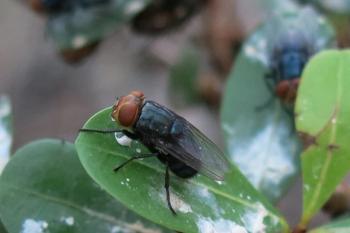
Horse slaughter days numbered
Washington — Legislation to terminate federal funding of inspections for U.S. horse slaughter facilities made its way into both cameral versions of the U.S. Department of Agriculture (USDA) appropriations bill. At presstime, Congress passed budget extensions for all U.S. agencies after missing the Oct. 1 deadline while House and Senate versions of federal spending bills are hammered out in conference, but observers expect the provision that would kill funding for inspection services at horse slaughter plants to make it into the final bill.
WASHINGTON — Legislation to terminate federal funding of inspections for U.S. horse slaughter facilities made its way into both cameral versions of the U.S. Department of Agriculture (USDA) appropriations bill. At presstime, Congress passed budget extensions for all U.S. agencies after missing the Oct. 1 deadline while House and Senate versions of federal spending bills are hammered out in conference, but observers expect the provision that would kill funding for inspection services at horse slaughter plants to make it into the final bill.
"This legislation could very well end our business," says Jim Bradshaw, consultant and spokesperson for the Dallas Crown and Beltex processing facilities in Texas. The two companies could be laying off about 150 people if the final language prohibits the facilities from paying for its own inspections.
The provision would expire Sept. 30, 2006 with USDA's budget, but an amendment was introduced in the House of Representatives in May that would prohibit horse slaughter for human consumption permanently.
The USDA Food Safety Inspection Service employs six people who inspect horse slaughter facilities; three are veterinarians. The agency otherwise declined to comment on pending legislation.
The American Veterinary Medical Association, American Association of Equine Practitioners, American Horse Council, and other allied groups under the umbrella of the Horse Welfare Coalition, have been working to defeat HR 503, dubbed the slaughter ban.
"The only reason we don't agree is because we don't believe that these horses will be better off," says Dr. Michael Chaddock, AVMA director of governmental relations. "Now that Congress has spoken, we still have that concern, and we are trying to determine what we can do to ensure that the 75,000 (horses slaughtered by the three U.S. facilities each year) will be taken care of."
Officials expect animals will be diverted to Canada and Mexico for processing.
Currently, the Texas facilities pay for the overtime wages for inspections, and they foot the bill for inspections of animals that are not listed in a century-old livestock recognition law. Ostrich and buffalo are a couple of species that slaughter facilities commonly pay the USDA for its inspections.
Unwanted horse discussion continues
"We're not sure who can answer that question for us. We have asked questions but, we have not received answers yet," Bradshaw says. "We hope that some things could get done in conference, but I doubt it."
Chaddock doesn't think USDA would allow a pay-for-service agreement, either, considering a Republican Congress has made its intent very clear, and Republican-appointed agency heads would buck the expressed intent of the legislature by allowing the facilities to pay for their own inspections.
It might not be too popular with the public, either. The Bureau of Land Management (BLM) halted its wild mustang sale program in April when several animals ended up at Caval International, a processing facility in DeKalb, Ill. A public outcry prompted an agreement not to process any horse that previously was owned by the federal government.
"We got a call from the head of the department who asked us to stop," says Jim Tucker, general manager for Caval. "Legally we could take them, but it's more bother than it's worth."
Tucker says he now must screen each person who inquires about his services.
About 200,000 horses have been adopted by private owners since the BLM's adoption program began in 1973. Earlier this year, Congress passed a bill that required BLM to sell its wild horses that are either more than 10 years old or have been passed over for adoption at least three times. About 8,400 out of the about 37,000 federally managed wild horses became eligible for sale under the new mandate, but after the Caval debacle, USDA voluntarily stopped its sale program. Congress might be changing its mind, too. A rider on the House version of the U.S. Department of the Interior's budget bill takes away the funding for BLM's sale program just a few months after it began.
The flood of unwanted horses could put heightened strain on equine rescue and retirement facilities that already are stretched thin, and it elevates the need for humane destruction and disposal services throughout the country.
"If you have 50,000 or even 20,000 carcasses, then it becomes and issue of how to dispose of these animals in an environmentally sound way," Chaddock says.
Newsletter
From exam room tips to practice management insights, get trusted veterinary news delivered straight to your inbox—subscribe to dvm360.





